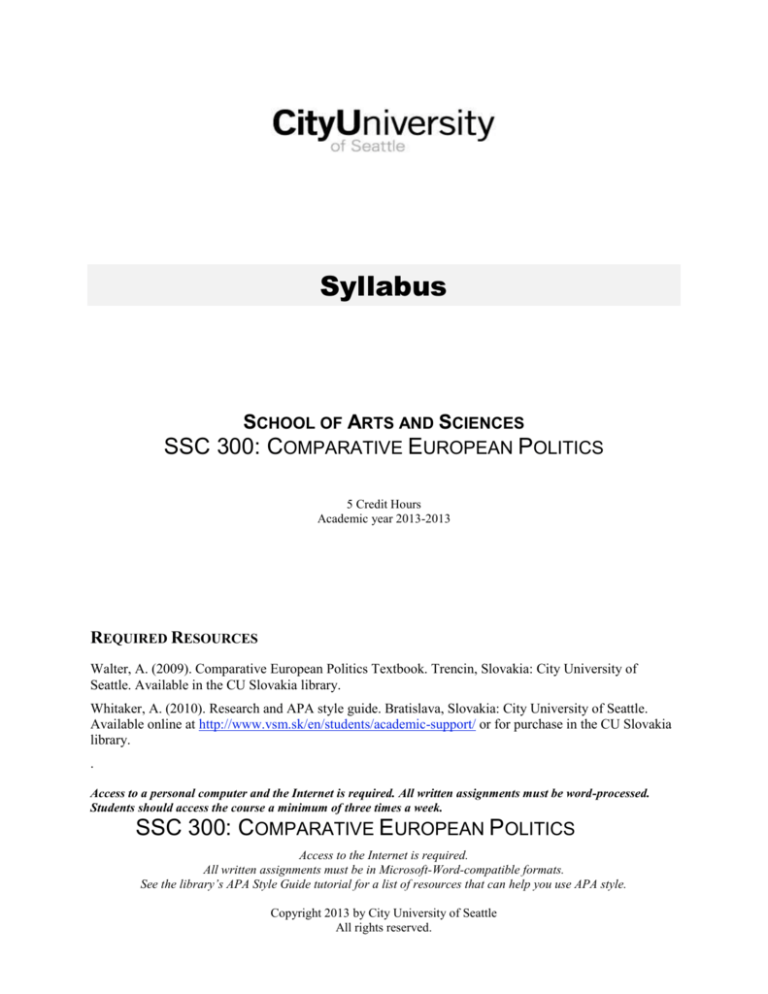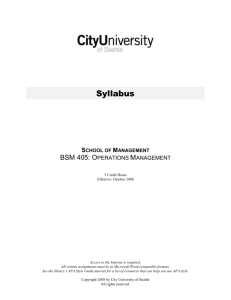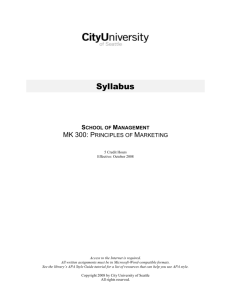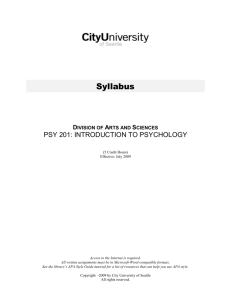
Syllabus
SCHOOL OF ARTS AND SCIENCES
SSC 300: COMPARATIVE EUROPEAN POLITICS
5 Credit Hours
Academic year 2013-2013
REQUIRED RESOURCES
Walter, A. (2009). Comparative European Politics Textbook. Trencin, Slovakia: City University of
Seattle. Available in the CU Slovakia library.
Whitaker, A. (2010). Research and APA style guide. Bratislava, Slovakia: City University of Seattle.
Available online at http://www.vsm.sk/en/students/academic-support/ or for purchase in the CU Slovakia
library.
.
Access to a personal computer and the Internet is required. All written assignments must be word-processed.
Students should access the course a minimum of three times a week.
SSC 300: COMPARATIVE EUROPEAN POLITICS
Access to the Internet is required.
All written assignments must be in Microsoft-Word-compatible formats.
See the library’s APA Style Guide tutorial for a list of resources that can help you use APA style.
Copyright 2013 by City University of Seattle
All rights reserved.
COURSE DESCRIPTION
This course examines political, social, and economic events in Europe and their relationships to political
developments in European states. The course covers various political aspects of the Cold War, the
transformation to market economies, and the challenges facing European states today in the age of
globalization and terrorism. By comparing the past and present political behavior of European states,
students will better understand what it is to be European.
COURSE RESOURCES
Required and recommended resources to complete coursework and assignments are listed on the
My.CityU portal at Library>Resources by Course.
CITYU LEARNING GOALS
This course supports the following City University learning goals:
Strong communication/interpersonal skills;
Critical thinking;
Diverse and global perspectives.
COURSE OUTCOMES
In this course, learners will:
Compare and contrast the social, economic, foreign, and security policies of states during and
after the Cold War and in today’s world of globalization and terrorism;
Explain the effects of global economic and political transformations and events on states’
political developments and national interests;
Describe and predict ways in which political institutions, federalism, public opinion, civil
liberties, political parties, and interest groups affect political behavior in different states;
Demonstrate how the political strategies of a party or politician are influenced by social or
economic events;
Synthesize information from a variety of sources to identify common trends in several states’
political development;
Analyze the causes of significant political events in a state and decisions by policy makers;
Evaluate and defend a state’s policy decision.
CORE CONCEPTS, KNOWLEDGE, AND SKILLS
Politics
State and nation
Political economy
Political ideologies: Marxism, Communism, Socialism, Liberalism, and Conservatism
Justice
Legitimacy
SSC 300
Page 2
Eff: 10/13
Cold War
Glasnost and perestroika
Democratization
Capitalism and the transformation to free market economies
Globalization
European Union
Political parties
Interest groups
Civil liberties
Public opinion
Differences between Parliamentary and Presidential Institutions
Federalism
OVERVIEW OF COURSE GRADING
The grade you receive for the course will be derived using City University of Seattle’s decimal grading
system, based on the following:
Overview of Required Assignments
Student Introductory Assignment
Analysis Essay
Online Discussion
Midterm Exam
% of Final Grade
0%
20%
25%
25%
Final Exam
30%
TOTAL
100%
RECOMMENDED SUPPLEMENTARY RESOURCES
As a City University student, you have access to library resources regardless of where and how you are
taking this class. To access the resources necessary to complete your coursework and assignments, visit
the library menu in the My.CityU portal at http://my.cityu.edu, and the CU Slovakia library home page at
http://library.cutn.sk/ or the CU Bulgaria library home page at http://www.cityu.bg
Search the CU Slovakia library’s online catalog to locate books, and use the Web site Directory to find
links relevant to your course. This site will also help you access City University’s online databases for
journal, magazine, and newspaper articles, or you can access them directly through the portal. You should
use these databases for research in this course. For additional help, visit the library or submit your
question in the Contact Us section of the Slovakia or Bulgaria library’s home page.
Smarthinking
As a CityU student, you have access to 10 free hours of online tutoring offered through Smarthinking,
including writing support, from certified tutors 24 hours a day, seven days a week. Contact CityU’s
Student Support Center at help@cityu.edu to request your access. The temporary user name is
CITYBSBUSAD and password TUTORING.
SSC 300
Page 3
Eff: 10/13
ELECTRONIC AND PRINT RESOURCES
You are expected to be aware of current international relations issues. These current events may prove
helpful as examples for midterm and final essays, bulletin board discussions and your analytical paper.
Therefore it is strongly recommended that you become a daily reader of international news in newspapers
or magazines. Some suggested resources are:
The Economist
International Herald Tribune
EuroNews (TV and online)
Wall Street Journal
Sme
Pravda
New York Times
BBC News (TV and online)
EXPLANATION OF ASSIGNMENTS AND GRADING
STUDENT INTRODUCTORY ASSIGNMENT
City University of Seattle requires that you submit a Student Introductory Assignment (SIA). This SIA
must be completed during the first week of your course. The SIA consists of introducing yourself in the
Discussion Forum titled: Student Introductory Assignment. It is designed to begin the online class
experience by letting us know you are in class and facilitating interaction. It is due at the end of the first
week. Even though this assignment is not graded, it is required in order for you to continue your course.
Your instructor will notify CU at the end of the first week as to whether or not you completed your SIA.
SPECIFICS OF COURSE ASSIGNMENTS
Your instructor will provide grading rubrics that will provide more detail as to how this assignment will
be graded.
Course Activities
Students will participate in group activities and class discussions. Students will be graded on their
demonstrated preparation for the session; their achievement of the goals of the activity; their ability to
present, explain, or defend alternative viewpoints; their ability to synthesize information and make
connections; the depth of their analysis; and the degree to which they have mastered the concepts and
principles of comparative European politics. Students who are absent will receive no credit for an activity.
Components
% of Grade
Asking questions of instructor
Asking questions of classmates
Discussing historical or current event
Attendance and active participation online
TOTAL
25
25
20
30
100%
Analysis Paper
Students will explore an event, concept, and/or personality that has affected and shaped European history
since 1960. In this paper, they will either analyze the reasons for a state or person’s political action or
decision, or analyze the effects of such an action.
A list of topics can be found on the Bulletin Board in a thread titled Analysis Paper Topics. You must
commit to a topic for the Paper in Week 4. You will not be able to change your topic after this.
SSC 300
Page 4
Eff: 10/13
In the analysis paper, you will analyze the behavior of a state or leader in international relations,
answering the question, “Why did the state do what it did?” Or “Why did the leader do what he/she did?”
You paper will explain all the different factors and reasons which influenced the state’s decision. The
paper will be minimum 4 pages in length to maximum of 6 pages in length using Times New Roman
font. You will use facts and examples from your research. While your paper will discuss a combination of
reasons, it will also make clear what you think are the most important ones.
The Analysis Paper must meet the criteria found on the posted Paper Guidelines handout. Please
note that you must use at least 5 sources for each paper. You are expected to utilize City
University’s online databases, and source information must be presented, cited, and referenced
according to APA style in the Research Paper Guide.
LATE PAPER POLICY: Papers are due at midnight (Slovakia time) on the day specified in the
syllabus. You must upload your paper by then. Late papers will lose 10% for every day they are late.
However, if you have a problem meeting a deadline, talk to me before the deadline, and I may be able to
give you an extension.
Components
% of Grade
Appropriate format and reference methods (Title
10
page, title, text, headers, reference page, and in-text
citations are correct. Paragraphs do not end with source
citations. Minimum and appropriate use of quotations.)
Clear Objectives and thesis (Topic introduced, its
importance explained. Strong, clear thesis supported
throughout paper.)
Logical development of body and thesis (Accurate
and valid reasons. One clear idea related to thesis in each
paragraph. Student’s own ideas, supported by logical
reasoning and evidence from sources. Clear explanation
of everything. Course concepts used accurately and
effectively. Logical order of ideas, and smooth flow
between ideas. Read has no questions or doubts.)
Depth, appropriateness, and use of research
10
50
10
(Minimum of five high-quality, acceptable sources
directly related to topic. Use of CU online databases and
primary and secondary sources. Sufficient, relevant,
well-chosen, effective cited ideas. Source material
introduced and explained.)
Grammar, spelling, punctuation, sentence structure,
clarity (Understandable and correct English. Third
20
person only.)
TOTAL
100%
Midterm Exam
Students will take a final exam to reinforce the course materials. The final exam will consist of
identification of terms and essay questions. Students will demonstrate their ability to compare and
contrast states’ policies, explain the effects of events on political developments and strategies, and
describe how political institutions, public opinion, civil liberties, political parties, and/or interest groups
affect political behavior in different states.
SSC 300
Page 5
Eff: 10/13
Components
% of Grade
Identification of terms
Complete and accurate definition/description, with
example (if possible)
Valid explanation of significance of the term in
international relations
TOTAL
Short Essay
Clear grasp of major issues posed by the question;
depth of ideas
Valid arguments; appropriate and sufficient
supportive detail
Appropriate analysis, evaluation, and synthesis
Demonstrated ability to employ terms/concepts
from course
Proper organization and logical flow of response;
clear thesis and focus
TOTAL
75
25
100%
20
20
20
20
20
100%
Final Exam
Students will take a final exam to reinforce the course materials. The final exam will consist of
identification of terms and essay questions. Students will demonstrate their ability to compare and
contrast states’ policies, explain the effects of events on political developments and strategies, and
describe how political institutions, public opinion, civil liberties, political parties, and/or interest groups
affect political behavior in different states.
Components
% of Grade
Identification of terms
Complete and accurate definition/description, with
example (if possible)
Valid explanation of significance of the term in
international relations
TOTAL
Short Essay
Clear grasp of major issues posed by the question;
depth of ideas
Valid arguments; appropriate and sufficient
supportive detail
Appropriate analysis, evaluation, and synthesis
Demonstrated ability to employ terms/concepts
from course
Proper organization and logical flow of response;
clear thesis and focus
TOTAL
SSC 300
75
25
100%
20
20
20
20
20
100%
Page 6
Eff: 10/13
ONLINE DISCUSSION
To help you understand the ideas of the course better, keep you in contact with the material, and prepare
you for the exams, we will discuss one or two topics on the bulletin board each week.
Each topic will open on Monday of each week and be open for 7 days. You must post your first response
to the questions by Friday. This first response should be approximately 250 words long. Throughout the
remaining days, read what others have written and add at least one more postings responding to others’
ideas. You should have at least four postings total per topic. You cannot make all your posts on the
same day. Your instructor may or may not respond to individual posts, but will enter the discussion with
comments, corrections, and additional questions. The instructor will close each topic.
After 7 days the topic will be closed and your participation will be evaluated. You will be evaluated on
participating regularly, being aware of the issues from the reading, expressing your own ideas clearly,
supporting your ideas, maintain a respectful and inoffensive tone, thoughtfully reacting to others’ ideas,
and using clear and appropriate English.
Grading Criteria for Online Discussion
% of Grade
Quality of Response (thoughtful, supported, clear)
Quantity of Appropriate Responses (4) per topic
TOTAL
35%
65%
100%
PROCTORED EXAMINATIONS
This course is offered from the Trencin CU/VŠM site, and all exams will be given by the instructor at this
site.
If you are a student registered at the other CU/VŠM site and would like to take your exams there, you
may use the CU/VŠM Proctor Center. However, you must inform your instructor about your interest in
taking exams at the Proctor Center before Friday of Week 3. Students who do not inform their instructor
on time cannot use the Proctor Center and must travel to the instructor’s site.
If you cannot take the exams in either Bratislava or Trenčín, you must find a proctor (e.g. local library
head, local university instructor), fill out the Proposed Proctor Approval Request Form
(http://www.vsm.sk/files/studenti/Proctor-Form-CU.pdf), and submit the form to your Associate Dean for
approval before Friday, Week 3. Also notify your instructor that you have submitted a proctor form.
Proctor forms submitted after the deadline will not be accepted and you will be required to take the exam
with your instructor.
BEWARE: the school applies a change in the proctoring policies - the students residing in Slovakia
cannot have an external proctor anymore, all students residing in Slovakia must take their tests 1. either
with their instructor on the official date announced in the syllabus or 2. with the official CU/VSM
proctor (Martina Krocita for Trencin and Valeria Medarova for Bratislava) in case number 1 possibility
does not work for the students and only if approved by instructor.
Students are not to be required / allowed to take tests on laptops.
ATTENDANCE REQUIREMENT
SSC 300
Page 7
Eff: 10/13
Students must take part in weekly online activities or at least contact their instructors once a week. Failure
to report for three consecutive weeks may result in being dropped from the class. That means that if there
is no contact between you and the instructor by the end of week 3, the instructor will drop you from the
course.
COURSE POLICIES
Late Assignments
LATE PAPER POLICY: Papers are due at midnight (Slovakia time) on the day specified in the
syllabus. You must upload your paper by then. Late papers will lose 10% for every day they are late.
However, if you have a problem meeting a deadline, talk to me before the deadline, and I may be able to
give you an extension.
Participation
Students are expected to be actively engaged in a discussion or other activities. Active engagement
means contributing substantive, thoughtful and reflective responses. If online, students must post their
initial responses during the first three days of the week, and their responses to other students’ postings
during the last four days of the week.
Professional Writing
Assignments require error-free writing that uses standard English conventions and logical flow of
organization to address topics clearly, completely, and concisely. CityU requires the use of APA style.
UNIVERSITY POLICIES
You are responsible for understanding and adhering to all of City University of Seattle’s academic
policies. The most current versions of these policies can be found in the University Catalog that is linked
from the CityU Web site.
Scholastic Honesty
City University of Seattle expects each student to do his/her own work. The University has "zero
tolerance" for cheating, plagiarism, unauthorized collaboration on assignments and papers, using
"notes" during exams, submitting someone else's work as one's own, submitting work previously
submitted for another course, or facilitating acts of academic dishonesty by others. Scholastic
Honesty policy applies also to online discussions that represent a part of assignments in online
courses. Every reference material used in discussion contributions must be cited according to the
current Research & APA Style Guide. The penalties are severe! A first offense results in a zero
grade for the course; a second offense can result in a zero grade for the course and suspension for
one or more quarters; a third offense can result in expulsion from the University. The Policy and
Procedures may be found at http://www.vsm.sk/en/students/scholastic-honesty/policies-andprocedures/.
In addition to providing your work to the instructor for grading, you must also submit an
electronic copy for the City University of Seattle archives (unless the work is specifically
SSC 300
Page 8
Eff: 10/13
exempted by the instructor). You will not receive a grade for particular work until and unless you
submit this electronic copy. The procedure for submitting work to the archives is to upload it via
the website http://www.vsm.sk/en/students/on-line-center/uploader/uploader.html . Files should
include the cover page of the work with the student name, instructor name, course name and
number, and date. File names should indicate the type of assignment, such as
“researchpaper.doc”, “casestudy.doc” or “ thesis.doc” (student name should not be a part of the
file name because the system adds it). All files received into the archives are submitted to
www.TurnItIn.com for plagiarism checking.
Attendance
Students taking courses in any format at the University are expected to be diligent in their studies and to
attend class regularly.
Regular class attendance is important in achieving learning outcomes in the course and may be a valid
consideration in determining the final grade. For classes where a physical presence is required, a student
has attended if s/he is present at any time during the class session. For online classes, a student has
attended if s/he has posted or submitted an assignment. A complete copy of this policy can be found in
the University Catalog in the section titled Attendance Policy for Mixed Mode, Online and
Correspondence Courses.
SUPPORT SERVICES
Disability Resources
If you are a student with a disability and you require an accommodation, please contact the Disability
Resource Office as soon as possible. For additional information, please see the section in the University
Catalog titled Students with Special Needs under Student Rights & Responsibilities.
Library Services
In order to help you succeed in this course, you have access to library services and resources 24 hours a
day, seven days a week. CityU librarians can help you formulate search strategies and locate materials
that are relevant to your coursework. For help, contact a CityU librarian through the Ask a Librarian
service. To find library resources, click on the Library link in the My.CityU portal.
SSC 300
Page 9
Eff: 10/13







